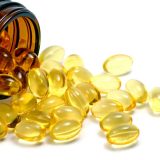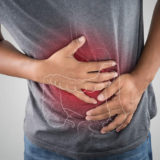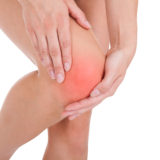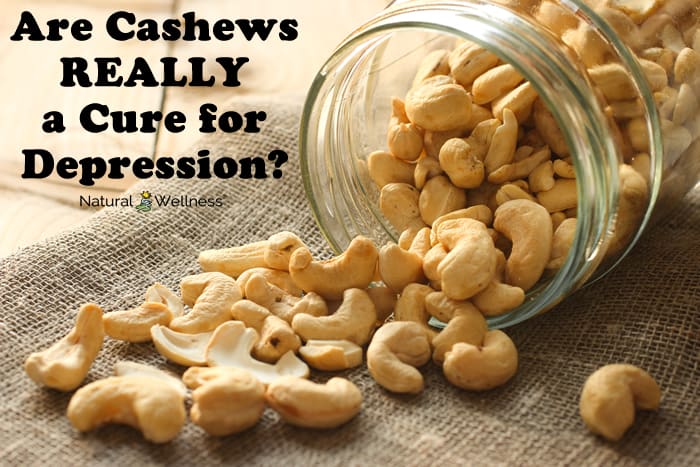

A cure? No. But they certainly don’t hurt.
Cashews have made headlines for their potential as a natural antidepressant.
This is because they contain high levels of:
- vitamin B3 (niacin)
- magnesium and
- L-tryptophan, an amino acid which the body uses to create serotonin.
Serotonin is a neurotransmitter that is critical for the normal function of the brain and has been shown to be a significant contributing factor in mood, depression and mental health. Serotonin is basically our body’s natural mood stabilizer, and many drugs used to treat depression impact serotonin production, its uptake, or mimic serotonin in the body.
Furthermore, B3, magnesium, and L-tryptophan are all believed to work in tandem to create serotonin.
Cashews: A Reintroduction
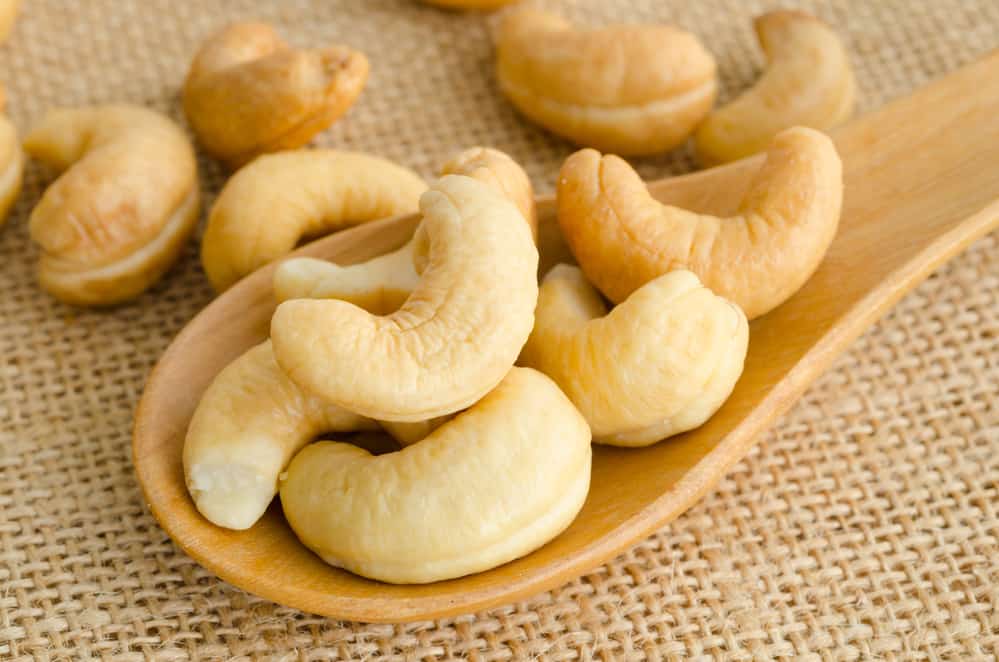
While they often get a bad rep for being higher in fat than other nuts, cashews are actually quite nutritious. To start, cashews aren’t nuts. Technically, they are the seeds that grow at the base of cashew apples.
Their shell is so hard it must be boiled or steamed first to be made soft enough to crack. The outside of the shell is also toxic, containing urushiol, the same chemical found in poison ivy. Once the shell is softened and the urushiol is dissolved, it’s cracked open and the inner skin can be removed. Only then are we left with the cashew in its familiar, creamy, nutty form.
One serving of cashews is 1 ounce (roughly 18 nuts) and contains approximately 166 calories. They are a great source of monounsaturated fat, copper and are cholesterol free. And in addition to being a good source of vitamin E and vitamin K, cashews are also rich in magnesium, which helps lower blood pressure and prevent hypertension.
However, while cashews may mildly improve your mood over time and are undeniably nutritious, they don’t make an adequate replacement for depression medication.
Many recent articles have claimed that cashews are a healthy replacement for Prozac, but there is little specific evidence to back this claim.
A Look at Depression
Depression is a serious condition that can arise from a variety of causes:
- biochemical issues
- situational stress
- abuse
- physical ailments or disabilities
- low social support
With such a wide and often overlapping list of contributing factors involved in managing depression, it is irresponsible to suggest that simply eating cashews is a viable treatment by itself.
Addressing depression or other mental health conditions is often a combination of:
- therapy
- medication
- emotional support
It should be monitored by a qualified physician.
Healthy Mind, Healthy Diet
What several studies and reputable institutions such as the Harvard Medical School show us, however, is that a healthy diet can greatly support improved overall health and mood, which may potentially lead to less severity in levels of depression overall.
There are high correlations between physical health issues and lack of social support; both of which contribute to depression. Anything that aids in maintaining physical health and wellness along with the ability to manage interpersonal relationships works to lessen symptoms and support the person battling depression.
There are many foods that offer the necessary amino acids, omega-3s, vitamins and minerals that support proper neurotransmitter functions in the brain and general health throughout the body. Making simple changes to your diet can lead to improved physical health and, by extension, improved mood.
6 Foods that Support Healthy Mood and Mental Action

- Nuts: Nuts in general (and cashews specifically) contain the amino acid L-tryptophan, which supports the body in the production of serotonin. More serotonin makes you happy. Nuts are also a source of unsaturated fats (“good” fats), omega-3 fatty acids (which maintain connections between neurons), fiber and vitamin E. According to the European Journal of Clinical Medicine, low levels of vitamin E are linked to clinical depression. Providing you eat them raw or dry roasted, and unsalted, all types of nuts are good for you, even cashews and the decadent macadamia. All nuts are a great source of plant protein, are cholesterol free, and are low in saturated fat. In fact, the majority of the fat in nuts is unsaturated, the heart-healthy type.
- Fish: Fish and other seafood provide an excellent source of niacin (B3), which we need for serotonin production. It’s also an excellent source of omega-3 fatty acids and a slew of other minerals necessary for proper brain function. Fish oil has also been purported to help smooth the mood swings associated with bipolar disorder and act as a mild memory enhancer.
- Seeds: Chia seeds contain calcium, magnesium, potassium, zinc, vitamins B1, B2, and our old friend niacin. Pumpkin seeds contain high levels of zinc and vitamin E. The magnesium and glutamate found in pumpkin seeds is also known for lowering anxiety and producing a general calming effect on the brain. Flax seeds offer omega-3 fatty acids while sunflower seeds provide vitamins E, B1, niacin, B6 and folate, all of which are critical to healthy brain function.
- Beans: Otherwise known as legumes, these little babies are a great source of antioxidants, protein, fiber and B vitamins, including niacin. An analysis of data from the National Health and Nutrition Examination Survey found that those who eat beans generally weigh less, have smaller waist sizes, and have lower blood pressures than people who don’t eat legumes. If that news doesn’t improve your mood we don’t know what will.
- Cheese: Cheese provides us with an excellent source of calcium, protein, phosphorus, zinc, vitamin A and vitamin B12. And the secret ingredient: the amino acid, tyrosine. When broken down in our bodies, tyrosine gives us feelings of contentment. The fats in cheese also encourage our brains to produce dopamine, a natural chemical released in our brains’ “reward center” that literally improves our mood and makes us feel good.
- Meat: Chicken and turkey contain high levels of niacin (B3), but even red meat contains moderate levels. Liver is a rich source of niacin, with lamb liver containing the highest levels of niacin per 100 grams at 83%. Turkey meat especially contains our old friend L-tryptophan, aiding our bodies in serotonin production.
Conclusion
While a healthy diet can improve overall health, which supports your body and brain in maintaining a positive mood, depression is a very serious condition with a wide range of contributing factors and requires proper treatment. Diet is only one aspect of treatment, and anyone dealing with depression should consult their physician or speak to a qualified mental health counselor who can assist them in managing their symptoms.
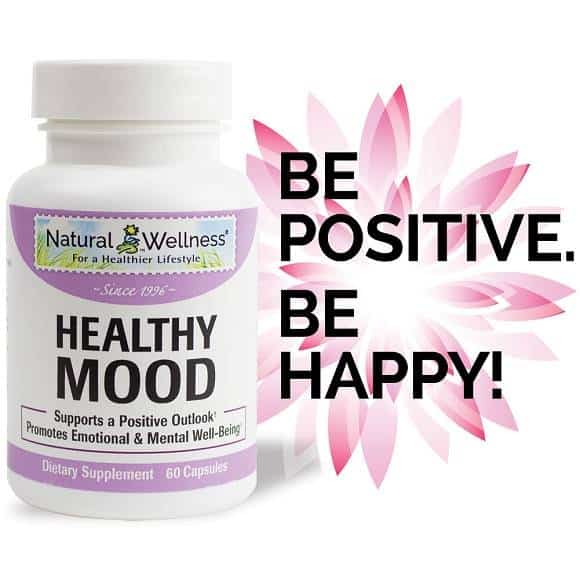
Editor’s Note: In addition to food, another natural option to support your emotional and mental well-being is with vitamins, herbs and amino acids. Natural Wellness’s Healthy Mood is just the supplement that can help you support a healthy and consistent mood. View full details.

